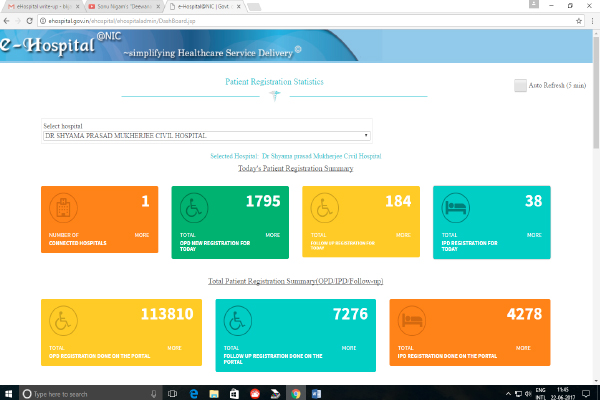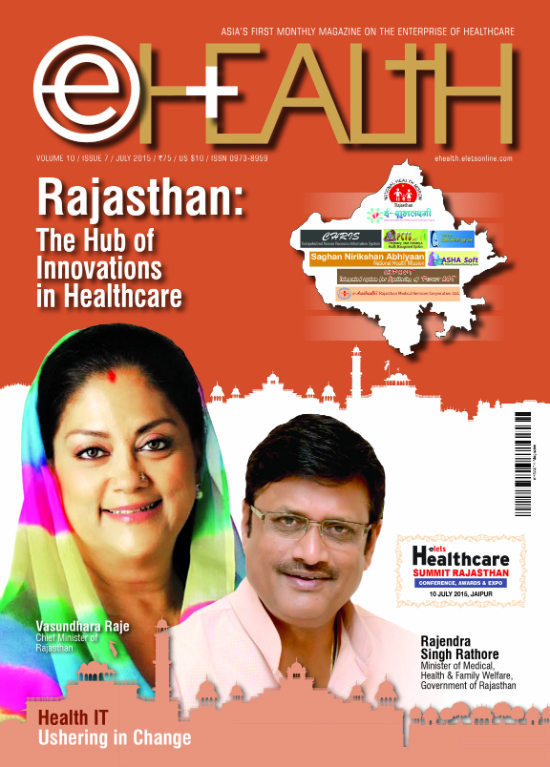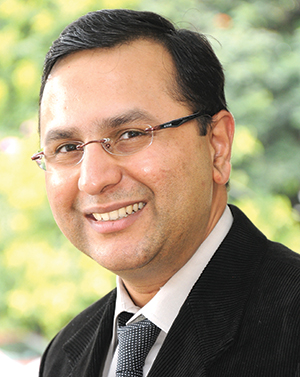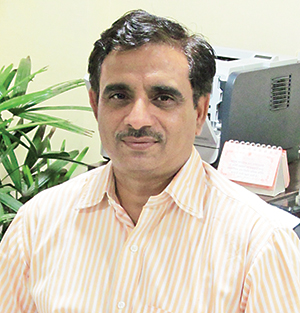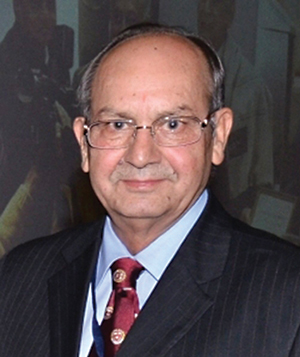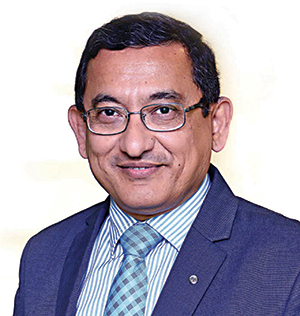 Improving nutrition through partnerships and innovations
Improving nutrition through partnerships and innovations
Rajasthan, one of Indian States, has a very high burden of micronutrient deficiency diseases such as an aemia, vitamin A deficiency,iodine deficiency disorders etc.These micronutrient deficiencies are prent across all socio-economic groups and affecting all age groups with high prence: 79.1 percent among children 6-35 months, 53.8 percent among ever-married women,and 61.7 percent among pregnant women. In addition, the occurrence of Neural Tube Defects due to folic acid deficiency is also very high (18per 1000 live births). Furthermore, Rajasthan also has a low coverage of vitamin A supplementation and poor compliance of iron folic acid (IFA)tablets amongst pregnant women.

Why Nutritional Deficiencies are Rampant

Typical Indian diet has more cereals(providing energy) and very little pulses/legumes (promoting growth)and vegetables/fruits (preventing diseases). Common micronutrients deficient in our diets are Iron, Iodine,Folic Acid, and Vitamin A, B12, D.

Absence of vitamins and minerals has serious consequences. An aemia and Vitamin A deficiency are considered public health problems and Vitamin D deficiency is emerging as a big problem among all segments.Low reach of safe drinking water,poor sanitation and hygiene are also other factors that impact health and nutrition as these affect the nutrient absorption, lower the immunity, and thus add to the disease burden and high levels of malnutrition.

Why Fortify Staple Foods
Food fortification is the process of adding micronutrients to food items offering an opportunity toward improving the micronutrient status of population. Fortification,especially of staples like wheat flour, oil, milk etc., is considered to be a good strategy to reduce dietary deficiencies. In Rajasthan, per capita consumption of wheat, milk and oil is higher than the average consumption in India hence these are good vehicles for fortification.
Advantages of Food Fortification
Staple food fortification has several advantages:
- It is a proven simple technology
- It has a positive impact on health status
- It is inexpensive as costs about 2 -10 paisa per kg of food item
- It improves national economic performance by improving the health status of people and hence their working capacity
GAIN Partnerships Supporting Large-scale Food Fortification
GAIN considers food fortification as an appropriate medium-to-long term strategy to reduce the high burden of micronutrient malnutrition. Hence, GAIN in Rajasthan signed a Grant Agreement with Institute of Health Management Research (IIHMR), in 2011, for providing support to build the capacity of food processing industries like roller flour mills oil refineries, milk dairies and centralized kitchens cooking Mid-day Meals, facilitate quality assurance and control and support social marketing and communication and policy advocacy for scaling up food fortification.
With all the efforts and advocacy,the GAIN-supported food fortification project in Rajasthan is progressing well. IIHMR University and GAIN have been actively engaging with Government, Food Industries, UN agencies, Civil Society Organizations and media for policy advocacy and positioning Food Fortification as a complementary strategy to reduce micronutrient malnutrition in the State.
| Staple Foods Fortified and Persons Reached in Rajasthan and Madhya Pradesh with Direct GAIN Support and Leveraged through Policy Advocacy |
| Food vehicle | Tonnage fortified per annum | Persons reached(approx.) |
| Wheat flour (with direct Project support) | 360,000 | 5,000,000 |
| Wheat flour (Provided / supported by the State Govt.) | 1,560,000 | 21,500,000 |
| Voluntary wheat flour by individual millers | 300,000 | 4,150,000 |
| Milk* (with direct Project support) | 564,000 | 7,421,000 |
| Oil (with direct Project support) | 600,000 | 83,000,000 |
| MDM and ICDS children reached through the centralized kitchens (with direct Project support)* | 1,100,000 |
- Specifically, IIHMR University, under the GAIN supported Project has actively engaged with the:
Food processing industries for their capacity building on Fortification. - Department of Food and Civil Supplies for main streaming fortified wheat flour in the Public Distribution System. Iron-spottesting kits were especially developed and provided to the Rajasthan State Food and Civil Supplies Corporation to undertakeQualitative assessment of flour fortification at the production level and also at the point of sale,i.e. Fair Price Shops.
- Regulatory bodies at the State and National level to get the standards of fortified foods notified/minuted.
- Commissioner,Food Safety, Rajasthan, to appraise the 7State Food Laboratories and identify the gaps that need to be strengthened for accreditation by NABL. All Food Safety Officers and the Chief Medical Officers in the State were trained on significance of Food Fortification and undertaking regulatory monitoring.
- Department dealing with MD Mand trained all the Master-trainers of Cooks-cum-helperson good nutrition and safe cooking practices.
- Government of Rajasthan (GoR)is highly committed to improve nutritional status of the people. It is reflected in the pronouncements of Honble Chief Minister in budget speech 2015-16, as below:
- Fortified wheat flour, for tifiededible oil and Double Fortified Salt would be provided to all the persons covered under the National Food Security Act, through the Public Distribution System
- Strengthening of the Food Safety laboratories in the State
MDM Directorate also issued a guideline in September 2013 to all the schools to use fortified soyadalanalogue and fortified oil for cooking the mid-day meals.
In addition, GAIN is actively engaged with UNICEF and the GoR to: - Prepare the States strategy document: Rajasthan Nutrition Mission,where in GAIN specifically contributed the strategy chapter on Food Fortification as a Complementary Strategy to Reduce Micronutrient Malnutrition
- Develop a partnership proposal forCommunity-based Management of Acute Malnutrition (CMAM)
- Honble Chief Minister has announced that the Government of Rajasthan will undertake rehabilitation of children suffering from Severe Acute Malnutrition(SAM) through the Community-based programme entitled:Community-based Management of Acute Malnutrition (CMAM)in 10 high priority districts(HPD) and 3 Tribal districts, in a phased manner
About Gain: Global Alliance For Improved Nutrition
The Global Alliance for Improved Nutrition (GAIN) is a Swiss foundation headquartered in Geneva with a special international status granted by the Swiss government. GAIN was created in 2002 at a Special Session of the UN General Assembly on Children.It is an alliance driven by the vision of a world without malnutrition.
GAINs approach is improving nutrition by building partnerships that enable innovations. It supports public-private partnerships to increase access to the missing nutrients in diets necessary for people, communities and economies to be stronger and healthier. It has a team of professionals located worldwide, which represents diverse sectors and backgrounds.
In less than a decade, GAIN has been able to scale its operations by working in partnership with governments and international agencies, and through projects involving more national partners and civil society organizations in more than 40 countries, reaching an estimated 811 million people with nutritionally enhanced food products.About half of the beneficiaries are women and children. GAINs goal is to reach 1 billion people by 2015 with nutritious foods that have sustainable nutritional impact.
GAIN has a Liaison Office in India since 2007. GAIN has supported projects on Staple Food Fortification,Mothers, Infant and Young Child Nutrition in Rajasthan, Madhya Pradesh, erstwhile Andhra Pradesh, Uttar Pradesh and Bihar. Besides this, GAIN is working at a National Level on the Salt Iodisation. GAIN adopts a multi-stakeholder approach to its work and its partners include National and State Government Ministries and Departments; Bi-Lateral and Multi-Lateral Agencies,National and International NGOs/Foundations working in India
Be a part of Elets Collaborative Initiatives. Join Us for Upcoming Events and explore business opportunities. Like us on Facebook , connect with us on LinkedIn and follow us on Twitter , Instagram.
"Exciting news! Elets technomedia is now on WhatsApp Channels Subscribe today by clicking the link and stay updated with the latest insights!" Click here!






